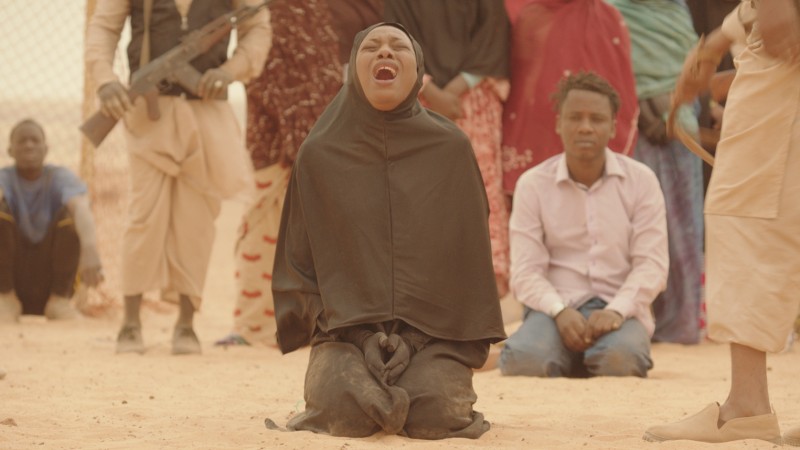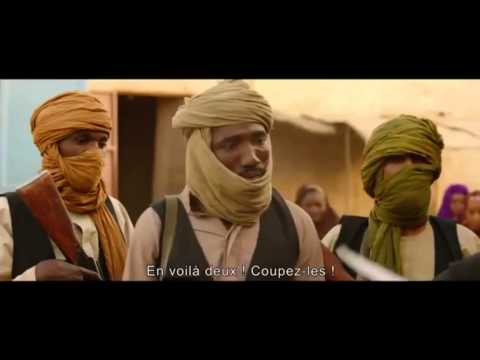
A woman in tears in a screen capture of a scene from the trailer for the film Timbuktu
Timbuktu, a film by Mauritanian director Abderrahmane Sissako, won big at the 40th Cesar Awards, France's equivalent of the Oscars, which took place at Paris's Théâtre du Châtelet on February 20 and 21, 2015. The film took home a total of seven Cesars, most notably for best feature film, but also including for best original music, best sound, best cinematography, best editing and best director.
The film, named after the historical city (and cultural capital) Timbuktu in northern Mali, is the story of a cattle herder Kidane and his family whose lives are completely disrupted by the civil war in the region. After Islamist groups took control of the city, the film depicts how the new rulers banned entertainment such as music, laughter, cigarettes and soccer from the lives of the residents. Women were especially oppressed (i.e., sentenced to lashes for singing) and were often maligned in the new improvised courts.
During the civil war, the Islamist groups (mainly AQIM and MOJWA) initially made an alliance with Tuareg (also known as Bellah in Mali) separatist group, the MNLA movement, against the Malian government. France and to a lesser degree Mauritania provided military help to the Malian government. The conflict came to an end with a ceasefire agreement in February 2015, but a few localized conflicts remain.
The film has been well received in France, where it has been seen by nearly a million viewers, more than any other African film in France's history.
In Africa, the film has also been the subject of many debates. Many netizens have declared their love for the film, including Dogon64, a reader of the news website Malijet. Dogon64 points out that he has actually seen the film, unlike other African commenters who have been discussing the film without having seen it. He shared his thoughts on Malijet.com:
Oui bravo à Abderrahmane Sissako, contrairement à beaucoup de critiqueurs (sic) sur ce forum j'ai vu ce film et j'ai aimé !Oui il a plein de lacunes, oui il ne raconte pas tout ce qui s'est passé, oui il évite le rôle du MNLA, mais il s'agit d'une fiction et Abderrahmane voulait simplement montrer l'hypocrisie de l'idéologie islamiste de ces djihadistes !
Et que vous le vouliez ou non, il a réussi !Maintenant vous les critiqueurs (sic) éternels, Kassin, Mossad, Balimamousso et autres, qu'attendez vous pour vous regrouper et faire un film à votre convenance, montrant la déviation de l'Islam de tous ces fous de dieu, les horreurs qu'ils perpetuent au Mali et ailleurs, ce qu'ils font des femmes, de leurs traffics de drogues et autres ! Qu'attendez vous ????
Peur peut-être de vous retrouver avec une fatwa sur le dos, comme les dessinateurs de Charlie-Hebdo ??
Ou vous auriez peut-être préféré que ce soit Abderrahmane qui prenne les risques ?
Il en a pris, c'est le seul film pour l'instant traitant de ce sujet ….en attendant le vôtre ?
Yes, hats off to Adderrahmane Sissako. Unlike a lot of critics on this forum, I saw the film and I liked it! Yes, it has plenty of faults. No, it doesn't tell everything that happened. Yes, it sidesteps the MNLA's role. But it's fiction, and Abderrahmane just wanted to expose the hypocrisy of these jihadists’ Islamist ideology! And like it or not, he succeeded! Now the ever-critical among you — Kassin, Mossad, Balimamousso and others — what are you waiting for? Why don't you get together and make a film the way you want, showing how far these nuts have strayed from God, the horrors they've unleashed in Mali and elsewhere, their treatment of women, their drug trafficking, and more! What are you waiting for? Maybe you're scared you'll get a fatwa issued against you, like the Charlie Hebdo cartoonists? Or would you rather Abderrahmane be the one to take that risk? In fact,Adderrahmane did take the risk and right now, his is the only film addressing this topic… unless yours is on the way?

“Here are two of them! Cut them!” Screen capture from Abderrahmane Sissako's film Timbuktu
On March 28, 2015, human rights activist Charles Sanches, who lives in Dakar, shared his positive view of the film:
J'ai vu Timbuktu hier. Un film magnifique. Les 7 Cesar sont mérités. Ce film aurait dû avoir au moins 1 Oscar. Je regrette d'avoir été mauvaise langue sans l'avoir vu. J'avais écrit une longue “critique” qui s'est effacée par inadvertance. Je vous recommande vivement ce film. Il est d'une beauté, d'une gravité et d'un esthétisme rares… Ce qui est une prouesse pour un sujet de film aussi délicat.
I saw Timbuktu yesterday. Brilliant film. It deserved all seven Cesars. It should have won at least one Oscar. I'm sorry I badmouthed it for so long before seeing it. I wrote a longer “review” but it got accidentally erased. I highly recommend this film. It has a beauty, a solmenity and an esthetic that is rare… which is an achievement for a film with such a difficult subject.
Many of Sanches's Facebook friends commented on his post. Sid-Lamine Salouka wrote:
HEUREUX!!! Je suis particulièrement heureux! Le film de Sissako a été vilipendé par des gens qui lui reprochent sa proximité avec le régime mauritanien mais qui ne parlent pas du film. Je convoque Césaire (et sa Lettre à Maurice Thorez) pour dire qu'être de gauche n'est pas un gage de bonne foi ni un certificat d'anti- paternalisme.Charles Sanches, tu me rends la nuit douce.
YAY!!! I am so happy! Sissako's film has been maligned by people who resent his affiliation with the Mauritanian government [editor's note: Sissako worked as a cultural advisor to current Mauritanian head of state Mohamed Ould Abdel Aziz] but they aren't talking about the film. As Aimé Césaire might say (like in his letter to Maurice Thorez), being leftist is no guarantee of either good faith or of anti-paternalism. Charles Sanches, you've made my night.
Lamine Fall says he enjoyed some aspects of the film, but remains critical of others:
Je valide sur l'esthétisme et le tact, et surtout sur comment a été operé le choix de la petite fille. Neanmoins un peu critique sur le chevauchement de certaines scenes.
I agree about its esthetic and tactfulness, especially the choice they made for the little girl. However, the overlapping of some scenes was not the best.
One of Sanches's friends in Dakar, Mia Toure, said that the film was quite popular in the capital of Senegal:
J'ai fait la queue 2 fois aujourd'hui pour le voir au CCF. A chaque fois , la salle était pleine.
I stood in line twice today to see it at the Institut français du Sénégal. Both times, the room was full.
Some of the film's critics think its success is influenced by the French government's war on religious extremism. Kassin on malijet.com is one of these critics, telling his fellow Malians to remain skeptical:
Ce film est plutôt une propagande mauritano-française pour présenter les touareg comme des victimes alors que ce sont les touareg du MNLA soutenus par la Mauritanie et la France qui sont à la base de la déstabilisation au nord du Mali.La charia a été appliquée en masse à Gao et à Tombouctou sur des populations majoritairement noires et non à Kidal où vivent la plupart des touareg rebelles.
Mais ce film passe sous silence la souffrance des Bellah qui subissent l'esclavage des touareg soutenus par la Mauritanie. Ce n'est pas maintenant que ce film est réalisé et il n'a rien eu aux festivités de Cannes 2014 alors pourquoi ce soudain couronnement? Faites très très attention à la propagande et cherchez toujours à savoir le pourquoi du comment. Salute.
The film is Mauritanian and French propaganda, portraying the Tuaregs as victims while the MNLA's Tuaregs were supported by Mauritania and France, which is what's caused destabilization in northern Mali. Sharia was enforced on mostly black communities in Gao and in Timbuktu, not in Kidal where most of the Tuareg rebels live. But the film is mum on the suffering of the Bellah people enslaved by the Mauritania-backed Tuaregs. It's not a brand-new film and it didn't make any noise at Cannes 2014, so why all this sudden acclaim? Be very wary of propaganda and always look out for ulterior motivations. ‘Bye.
On the same site, Kibilly Soussakho draws attention to the political aspects of Timbuktu:
Je suis désolé ,mais sans mettre en cause la valeur réelle de son film ,je pense que ce prix ,surtout accompagné d'une telle razzia de statuettes ( prix d'interprétation ,meilleure musique etc ..),donc ce prix a une forte odeur politique .Et puis quand cet homme faisait le film Bamako avec Aminata Dramane Traoré ,on disait qu'il était Malien etc …et puis il devient brusquement Mauritanien .Et puis avec l'état de surislamisation avancée de la Mauritanie ils vont être bientôt obligé de faire assurer sa protection par des gardes de corps ,si ça se trouve, une FATWA est déjà sur lui .En tout cas moi je ne suis pas surpris par ce Cesar
I'm sorry, I don't want to question the film's quality, but the fact that it won this award, especially since it received a whole slew of them (best director, best music, etc.), seems politically motivated. And when this man was making the film Bamako with [former Malian Minister of Culture] Aminata Dramane Traoré, they said he was Malian… and all of a sudden he's Mauritanian. And given the advanced state of Islamization in Mauritania, he will soon have to hire bodyguards to ensure his safety if a fatwa hasn't already been issued on him. In any case, I'm not surprised by this award.
On the site africultures.com, MlleMemr posted a comment entitled STOP AU LOBBY DE TIMBUKTU (Stop Supporting Timbuktu):
Avant de lire mon texte, regardez ce lien.
Un film pour les bons blancs de France perdus dans leur mythe de l'homme bleu. Timbuktu est une grosse farce qui magnifie l'indigne. Bravo pour les jihadistes “humanisés”. Ceux sont des barbares et ce film est trompeur. Bravo aux journalistes français pour leur soutien au scénario de ce film sans saveur. Suivez ce lien et Mr Barlet (auteur de l'article), merci de vous en inspirer avant de nous endormir avec vos critiques insipides dont on ne sait à qui elles s'adressent.
Before reading my comment, watch this video. A film for white French people enchanted by the myth of the “blue people.” Timbuktu is an absolute farce that glorifies those who should not be glorified. Good for the “humanized” jihadists. They are barbaric and the film is deceptive. Good on the French journalists supporting this tasteless film. Follow the link above and Mr. Barlet (who wrote this article), please take it into account instead of putting us to sleep with your bland reviews that try to please everyone.
Many reactions have been triggered by excerpts of the film posted on Youtube. Still, opinions are divided. At the African film festival in Ouagadougou, FESPACO, the film's screening was controversial due to fear that it would incite terrorist attacks. Only once Burkina Faso's transitional government stepped in did the festival organizers decide to go ahead with the screening.






